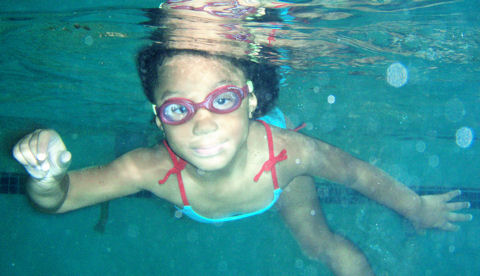
Have you ever tried to listen underwater?
We hear sounds differently underwater than on land and the U. S Navy can tell us why.
On land, say Navy researchers, sound travels through air conduction. Sound waves travel through the air, causing our eardrums to vibrate. This makes the three bones in our middle ear vibrate, and causes sensory cells in the inner ear to kick off an electrical signal that travels to your brain.
Hearing through our bones
But when underwater, sound bypasses our eardrums and the bones of the middle ear and travels through the mastoid bone (the bone we can feel with our fingers behind our ear) to get to the inner ear. This is called bone conduction.
These Navy researchers determined that bone conduction allows us to hear sounds underwater that are much higher in pitch than sounds we hear on land. There was one study, in which the participants were able to hear frequencies as high as 200,000 hertz underwater. That is ten times higher than the top frequency (20,000 hertz) that we are able to hear on land. This information is sure to be helpful in the development of new hearing aid technology and could have other practical value that is yet to be determined.
Similar ear ancestry
Believe it or not, our ears were developed from the same ancestors as the ears of dolphins and whales. This is because whales and dolphins had land-based ancestors that made their way into the ocean millions of years ago. Along the way, their ears were modified so that they could clearly hear sounds underwater and tell where they were coming from.
Read one of the articles from U.S. News that initially shared this information. You’ll see lots more details about the U.S. Navy’s research.
Next time you’re in the pool, test your underwater hearing to see what you hear!
Little Otter Swim School’s provides quality swim lessons in a safe and fun environment that are taught by caring and enthusiastic teachers. Children are learning and gaining respect and love for the water.
From Little Otter, Charlotte families receive an alternative to “typical” swim lessons in year-round, small group instruction in a warm indoor swimming pool where parents can watch their children’s progress from the comfortable viewing gallery.
Learn more about what makes Little Otter different.


Conversations